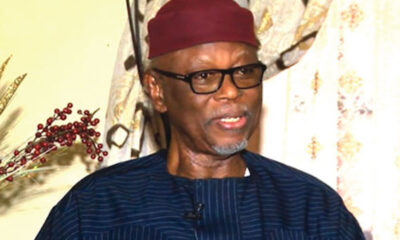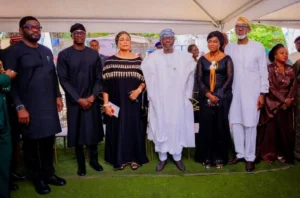EVENTS
Economic Crisis: Job Losses As 16 Multinationals Exit Nigeria In 3 Years

As Nigeria battles an economic crisis sparked by the government’s twin policies of petrol subsidy removal and unification of FX windows, United Kingdom-based Diageo joined about 15 other multinational companies that have exited the country in the past three years.
Diageo is the latest to announce its departure on Tuesday, June 11 when it said it will sell its 58.02% stake in Guinness Nigeria to Tolaram.
Diageo joins others like Kimberly-Clark, manufacturers of Huggies and Kotex brands of diapers; US-based Procter and Gamble (P&G); GlaxoSmithKline (GSK); Unilever and Sanofi-Aventi Nigeria, who are either exiting completely or reducing their exposure in a country facing its worst cost-of-living crisis in decades.
Unilever Nigeria announced its exit from the home care and skin cleansing markets in Nigeria in November 2023, saying it did so “to find a more sustainable and profitable business model.”
Procter & Gamble was the last to announce its exit from the country the same year.
Similar reasons given by these and other companies include high energy costs, currency depreciation, insecurity etc.
The Federal Government itself acknowledged these challenges in an interview granted by Minister of Finance, Wale Edun on Channels Television’s Sunday Politics programme, where he said “lack of a liquid foreign exchange market was the major reason why some multinational companies exited Nigeria,” explaining that the inability of the exiting multinationals to access foreign exchange was a major impediment to their operations in the country.
Weighing-in, the Director-General of Nigeria Employers’ Consultative Association, NECA, Adewale Oyerinde, disclosed that at least 15 multinationals have either divested or partially closed operations in the country in the last three years.
Oyerinde, in his assessment, stated: “Over 15 organisations, with a combined value-chain staff strength of over 20,000 employees, have either divested or partially closed operations,” lamenting that this has “dire consequences not only for organised businesses but also for labour, government revenue and the households; massive job losses across sectors, which would continue to create insecurity challenges”.
Oyerinde added, “When NECA examined the exit of prominent companies like GSK, Sanofi, Procter & Gamble, Nampak, and others, who had been doing business in Nigeria for decades and were huge employers of labour, it was worried about the ripple effect on the broader business ecosystem.
“Within the value chain, numerous enterprises serve as suppliers to these major corporations, and their sustainability is significantly compromised when the primary businesses they cater to face extinction.
“The survival prospects of these secondary businesses are at stake, and their employees are also at risk, as the departure of the main clients could lead to their demise. The crisis within the value chain deserves more attention than it currently receives”.
Related NewsJob losses: 10,733 affected workers get N4.5b part pension paymentJob Losses: 10,733 affected workers get N4.5bn part pension paymentReactions as Warri lady ‘tired of life’ jumps from flyover to death
Other sectoral group leaders and analysts maintain that the continuous exit of multinational firms would dampen Nigeria’s $1trn GDP target of President Bola Tinubu’s administration.
The President had, at the 29th Nigeria Economic Summit in Abuja, told business leaders and Nigerians that Nigeria’s economy can grow to $1 trillion by 2026.
Analysts believe the persistent exit of multinational companies from the country is set to impact negatively on this target.
Data from the National Bureau of Statistics (NBS) revealed that the performance of the GDP in the first quarter of 2024 was driven mainly by the services sector, which recorded a growth of 4.32 per cent and contributed 58.04 per cent to the aggregate GDP, whereas the nominal GDP growth of the manufacturing sector in the first quarter of 2024 was recorded at 8.21 per cent (year-on-year), 9.64 per cent points lower than the figure recorded in the corresponding period of 2023.
Real GDP growth in the manufacturing sector in the first quarter of 2024, on its part, was 1.49 per cent (year-on-year), lower than the same quarter of 2023.
Reacting to this, President of the Manufacturers Association of Nigeria (MAN), Otunba Francis Meshioye said, “MAN expects the government to frontally address insecurity, improve electricity supply, promote fiscal sustainability and ensure policy consistency.
“Among other priorities, the fiscal authority must also lend supportive measures by adequately incentivising the manufacturing sector and other productive sectors.
“This is very important to boost non-oil export earnings in addition to the increase in oil export proceeds occasioned by increased oil production, rising global oil prices and the coming on stream of the Dangote Refinery”.
Director-General of Lagos Chamber of Commerce and Industry (LCCI), Dr. Chinyere Almona, also speaking on the issue, said: “Over the last few months, there has been a consistent increase in exit plans or a reduction in involvement in the Nigerian market by the multinationals, and this trend is worrisome.
“We have seen the likes of Unilever Nigeria, GlaxoSmithKline, and recently now Guinness Nigeria Plc.
“In Nigeria, lingering foreign exchange scarcity, poor power supply, port congestion, multiple taxation, insecurity, and poor infrastructure, among others, have taken a toll on many businesses in the country.”
The chamber recommended that the government should implement measures to stabilise and ensure the availability of foreign exchange for businesses, particularly those operating in dollar-denominated environments, also imploring the government to create a more flexible and transparent foreign exchange policy to address scarcity issues.
“Further, the Chamber urges the government to engage multinational corporations and the business community to understand their challenges and gather input and feedback on policy decisions to collaboratively develop solutions that will forestall the exodus of businesses from Nigeria. The CBN should prioritise the stability of the country’s currency and adopt the right policy mix to ensure price stability,” Almona said.
National President of the Association of Small Business Owners of Nigeria, ASBON, Femi Egbesola, maintained that multinationals are among the companies that contribute largely to the country’s GDP and earnings.
“We cannot be talking of growing our economy when the real investors are leaving. Assuming they are leaving and the indigenous ones are increasing, it would have been a different thing. But that is not the case. You make income as a nation when you have investments and investors,” he said.
However, since the coming of the Tinubu administration, Tinubu and Edun, among others, have been speaking on efforts being put in place towards revamping the economy, encouraging Foreign Direct Investment (FDI) and also making local industries vibrant and competitive.
Whether the assurances of Edun, who, on the Channels Television’s Sunday Politics programme, said, “recent executive orders signed by President Bola Tinubu have improved the investment climate … and also disclosed that tax reform proposals aimed at simplifying doing business for local and foreign manufacturers are being considered as part of an Economic Stabilisation Package,” would stem the flow of multinationals exiting the country, only time will tell.
EVENTS
Sanwo-Olu attends 50th memorial ceremony for General Murtala Muhammed
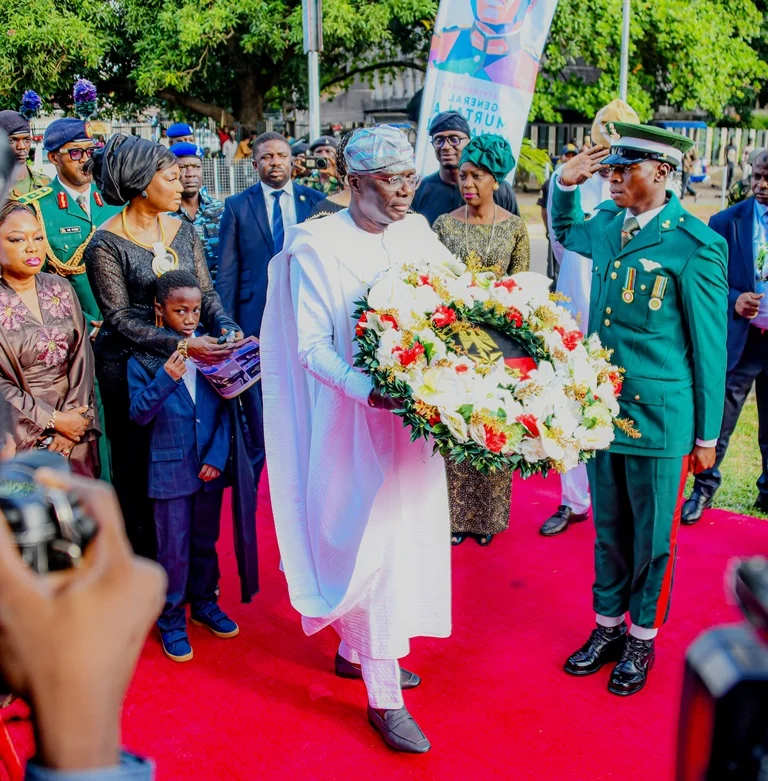
Governor Babajide Sanwo-Olu of Lagos State on Friday participated in a wreath-laying ceremony marking the 50th anniversary of the death of the late General Murtala Ramat Muhammed, GCFR.
The event was attended by notable dignitaries, including Senator Daisy Danjuma, wife of retired Lt. General Theophilus Danjuma; Dr Aisha Muhammed Oyebode, daughter of the late General and CEO of the Murtala Muhammed Foundation; her husband, Gbenga Oyebode; and Hon. Bola Oladunjoye, Chairman of Ikoyi-Obalende LCDA, among other officials and guests.
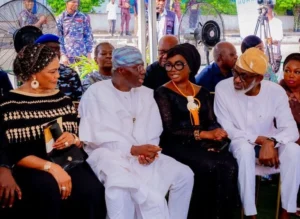
Wreaths were laid at the cenotaph in honour of General Muhammed, celebrating his life, leadership, and enduring contributions to Nigeria.
General Murtala Ramat Muhammed served as Nigeria’s Head of State from July 1975 until his assassination on February 13, 1976.
EVENTS
GOVERNOR SOLUDO’S ULTIMATUM AND THE BATTLE FOR ANAMBRA’S MONDAYS, SHUTS DOWN ONITSHA MAIN MARKET FOR A WEEK
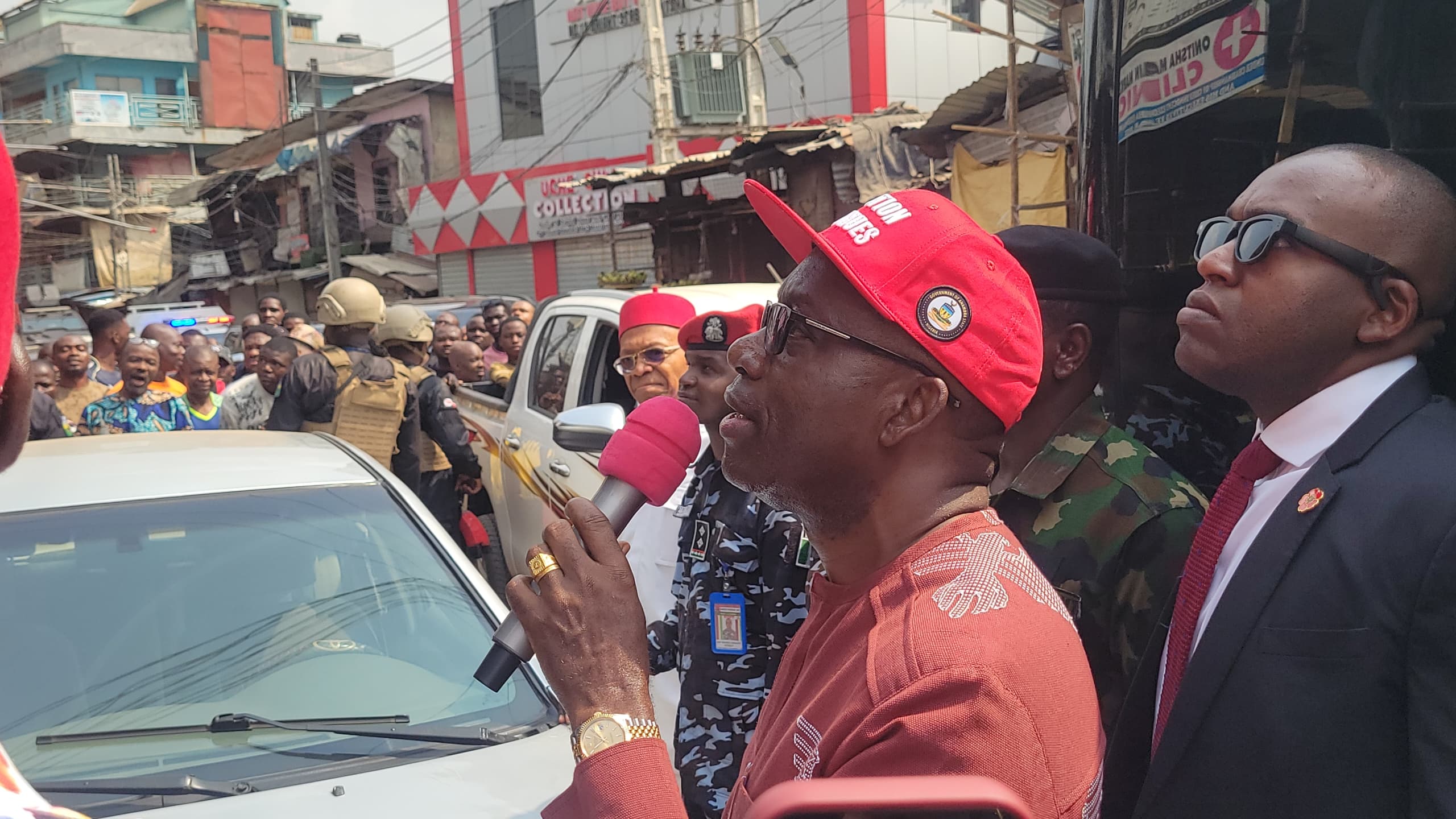
By Christian ABURIME
Anambra State Governor, Prof Chukwuma Charles Soludo has ordered the immediate shut down of the Onitsha Main Market for one week, following defiance of the market leadership to open, against government directive.
Governor Soludo’s order for a one-week shutdown of the sprawling market is more than an administrative penalty. It is the latest, and perhaps most drastic, salvo in a protracted war over who controls time and economic life in Southeast Nigeria on mondays. The enemy is the long-standing, fear-enforced Monday sit-at-home order, a ghostly mandate from non-state actors that has strangled businesses and normalized weekly monday sit-at-home for years.
The Governor’s move is a direct response to what the government sees as baffling defiance. Despite repeated assurances of enhanced security and appeals to reclaim public spaces, many traders at the iconic market again chose to keep their stalls locked. Their absence was a quiet rebellion, but one that spoke volumes about the lingering climate of apprehension.
“The government cannot stand by while a few individuals willfully undermine public safety and disregard official directives meant to restore normalcy, this is plain economic sabotage. We are not going to allow this”, Governor Soludo stated, framing the closure as a protective measure for the “law-abiding citizen.” But his subsequent warning carried the weight of an escalating ultimatum: if the market does not reopen for business after this one-week shutdown, it will be sealed for a month. “And so on and so forth,” he added, drawing a line in the sand.
“You either decide that you are going to trade here or you go elsewhere. I am very serious about this”, the Governor insisted.
The scene at the market was one of tense enforcement. A joint task force of police, army, and other security personnel moved swiftly to secure the perimeter, turning away the few hopefuls who approached.
For the Soludo administration, the solution is unwavering enforcement to break a psychological barrier. The strategy is clear: make the cost of compliance with the illegal sit-at-home order higher than the fear that drives it. By targeting the economic heart of the region, the government aims to trigger a collective shift in behavior, betting that the traders’ desire to trade will ultimately outweigh their fear.
As the gates remain locked this week, the standoff in Onitsha encapsulates the broader struggle in the Southeast. It is a fight over normalcy, authority, and the fragile psyche of a populace caught between enforced directives and imposed orders. When the gates are scheduled to reopen next Monday, all eyes will be on the traders. Will they return to their stalls, emboldened by the state’s show of force? Or will the silent, empty aisles deliver a different verdict?
The answer will determine not just the fate of a market, but the rhythm of life in Anambra for Mondays to come.
https://www.instagram.com/reel/DT-PAX-DIAi/?igsh=bzVxOGgzcTF0OG5k
EVENTS
Man Goes Viral After Posting 17-Year Throwback Photos Of Him And His Wife

A Nigerian man has gone viral on X (formerly Twitter) after sharing throwback photos of himself and his wife from when they were both still children.
In the post, @Sadeeq_Malo revealed that he has loved his wife for 17 years, describing her as his uncle’s daughter, a statement that immediately caught the attention of social media users.
Sharing the photos, he wrote:
“17 years of love. I fell in love with her from the day she was born — my uncle’s daughter, now my bride. Allahummah Barik.”
The old photos, which show the couple as children, were shared alongside recent pictures of them as a married couple, sparking massive engagement online.
The post has since divided opinions on social media. While some users defended the union noting that cousin marriages are culturally acceptable in some communities, others focused on the unusual wording of his declaration.


Reacting, one user wrote, “Fell in love from the day she was born? That sentence alone is wild.” Another commented, “People should calm down. Cousin marriage is normal in many cultures.”
Despite the mixed reactions, the man appears unfazed, celebrating what he describes as a 17-year journey of love that eventually led to marriage.
Check post below….

-
Business1 year ago
US court acquits Air Peace boss, slams Mayfield $4000 fine
-

 Trending1 year ago
Trending1 year agoNYA demands release of ‘abducted’ Imo chairman, preaches good governance
-

 Politics1 year ago
Politics1 year agoMexico’s new president causes concern just weeks before the US elections
-

 Politics1 year ago
Politics1 year agoPutin invites 20 world leaders
-

 Politics1 year ago
Politics1 year agoRussia bans imports of agro-products from Kazakhstan after refusal to join BRICS
-
Entertainment1 year ago
Bobrisky falls ill in police custody, rushed to hospital
-
Entertainment1 year ago
Bobrisky transferred from Immigration to FCID, spends night behind bars
-
Education1 year ago
GOVERNOR FUBARA APPOINTS COUNCIL MEMBERS FOR KEN SARO-WIWA POLYTECHNIC BORI





